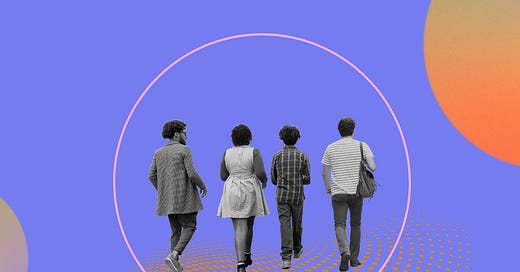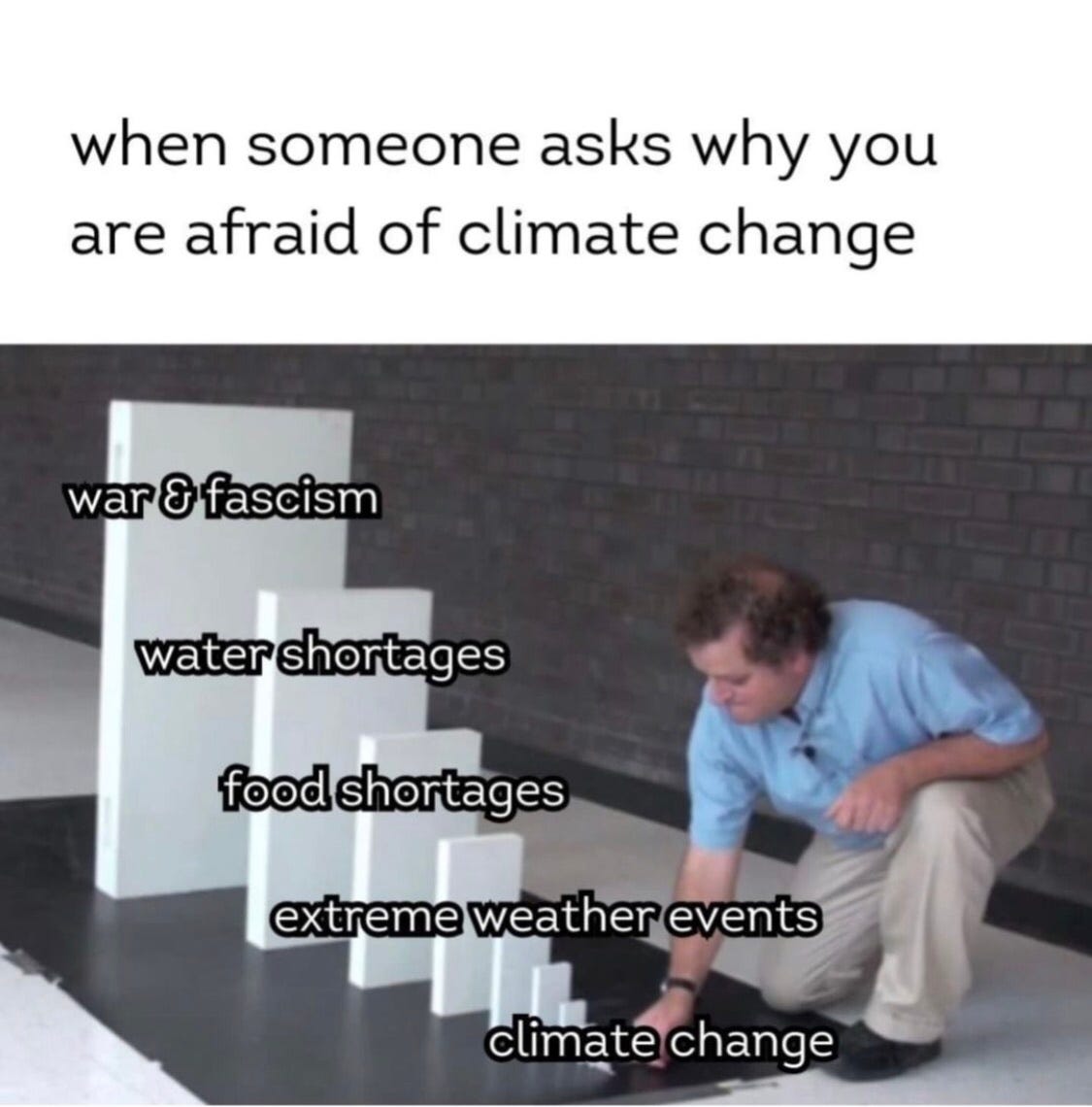Dear Climate Therapist: How can I help my students face the emotional weight of long-term climate careers?
A climate educator ponders how to build psychological resilience when the very work you're doing is a constant reminder of what’s at stake
In this week’s column, we hear from an instructor seeking advice for how to guide students who must regularly confront the devastating impacts of the climate crisis in their studies and their future careers. In this context, traditional advice like "practice self-care" feels superficial, making it difficult to find relief or joy when the evidence you’re tasked with studying bears such a heavy emotional burden. Our resident climate-aware therapist (CAT), Kyle Hill, encourages students, scientists and scholars to embrace the power of mutual care, where grief, anxiety, and fear are not suppressed but acknowledged and held in the presence of others. Indigenous teachings remind us that we do not stand alone in the face of crisis; we are part of a larger network of kinship that extends beyond human communities to the land, water, and all living beings. In this way, Kyle’s advice isn’t about avoiding confrontation with reality, but about approaching those realities from a place of relational strength to recognize that suffering is communal, and the burdens of trauma, whether from colonization, environmental destruction, or loss, are best addressed in a collective context.
Dear CAT,
I wonder what advice you might have for instructors and scientists about the healthiest/most supportive ways to structure engagement with the facts of loss and catastrophe due to climate change over a long-term course of study (or career)? As a graduate student, I studied climate science and also taught students about forecasts for the impacts of climate change, and was alarmed by the way we approached this material without addressing its inevitable emotional impact. When I brought up the subject to my peers and with my students, they shared that it is very challenging not to internalize guilt, shame, and fear after studying climate change in depth, and were unsure how to understand their responsibility related to living in systems that perpetuate large-scale climate harm. Generic advice to practice self care and seek joy in the natural world around you can be inadequate guidance for someone who is required to study the damning evidence in great detail for hours each day. In my graduate program, we are beginning to discuss this topic together and would be grateful for your guidance.
- Bowled Over in Berkeley
Design by Gen Dread
Dear Bowled Over in Berkeley,
As a fellow climate scientist, land defender, water protector and Indigenous person, I share your sentiments regarding the difficulty existing in our minds while our ecosystems are under distress. The privilege of knowing our other-than-human relatives cultivates connection: it’s a relationship, much like what we share with our own communities and families. We grieve loss, feel anxious and sad when we see our ecosystems being violated without the necessary support or empathy from our human community. While we mourn the environmental shifts and climatic changes that are actively occurring, we inevitably feel that we are not doing enough. Unfortunately, our healthcare systems are unequipped to support us in this moment, if only because they ask us to heal in poorly lit offices occupied with the faint smell of essential oils as strangers question how our thoughts are impacting our emotions, and our emotions are impacting our behaviors. This may be evidence-based treatment for some disorders that help us to pull ourselves up by our bootstraps. But our needs call for our healthcare and educational systems to divest, to meet us outside, and to pool our collective resources into developing interventions that heal all of us, including our other-than-human relatives.
What has helped dampen the guilt, shame, and fear for many can be organized across three actionable and important steps (for lack of a better word): 1. perspective-taking, 2. Finding community and staying rooted in community, 3. The ceremony of being on the land. First, it’s important to digest and understand the evidence and science of climate change, however, we can also take note of our collective opportunities to engage in efforts to supplement planetary health and climate justice. Taken together, both of these areas recognize the harmful impacts of settler-colonialism on our lands and ecosystems while also endeavoring to implement strategies that bring us closer to our natural world, connecting us to our earth. As Anishinaabeg people, one of our creation stories finds humans here last, treated to a world of beauty, kinship and abundance. Yet, so many teachings tell us to only take what we need, to give thanks and gratitude for the harvest, and this reciprocity will support us in perpetuity. So, on the mother earth level, our kinship and interconnectedness is with mother earth, and at the human level, we are all in this sacred hoop of life, together. That is where the community holds us up.
As scientists and scholars, we need community, especially when the science is dire. To feel, to love, to hold space with one another. Community is beautiful and we deserve to share and communicate our emotions and heal, so we can return to the Land and engage from a place of love, rather than fear. The Land is part of us. We relate to her and she provides her harvest for us. Reciprocity and kinship, this will heal us all.
Though, to be honest, I am afraid, too.
Mitakuye Oyasin (all of my relatives),
Kyle
Making Waves
Britt here - I’m very excited to share our new survey of climate emotions, thoughts, and plans of youth in the US was just published in Lancet Planetary Health. After surveying nearly 16,000 16-25 year olds in the US, we find that a supermajority of young people, regardless of political affiliation, report widespread distress about climate change, with many Gen Zers saying it's impacting their mental health and major life decisions including where to live, career paths, and whether to have children. 85·0% of respondents endorsed being at least moderately worried, and 57·9% very or extremely worried, about climate change. They express a strong desire for more action from the U.S. government and corporations to address the crisis, coupled with disappointment in the current response. They also want their parents and grandparents to understand their feelings about the climate crisis, and want to talk about climate change more. Learn more about the study in the Guardian’s coverage or read the full article here.
We’re excited to support long-time youth climate organizer and climate misinformation scholar, Dr. Grace Nosek, in the launch of her new book Rootbound, a gripping young adult climate fantasy novel bursting with hope, heart, adventure, and mystery (think Greta Thunberg x Percy Jackson). The book draws from her thousands of conversations with students to create a portal into a new climate world.
Britt will be part of the teaching team for the Climate Psychology Certificate (CPC) at California Institute of Integral Studies (CIIS) in Spring 2025. The Climate Psychology Certificate provides psychological training and skills for therapists, healers, and allied professionals to address the growing mental health impacts of the climate emergency. They’re offering a $500 referral discount on the program fee with code: CPCSPR25. Learn more about the program here.
Fellow Substacker Paul Shattuck writes an insightful article describing how climate anxiety and despair are engineered byproducts of what the famous sociologist Ulrich Beck called the risk society.
Pioneering environmentalist Renee Lertzman launches her own Substack for existential change management called Becoming Guides. It’s really good, check out the latest piece on scaling attunement.
‘Till next time!
<3 Gen Dread







I so appreciate Kyle's advice and wisdom here! It's insightful and beautifully helps to ground us in the what and why of our work, and in the spiritual relationships that will sustain us. I'm teaching a class on this very subject at my university this term--Eco grief and climate anxiety weigh heavy on our students. I'm also sharing the class with Substack readers for free, for anyone who might find it helpful. https://open.substack.com/pub/suzannecrawfordobrien/p/going-back-to-school-and-im-bringing?r=dw83v&utm_campaign=post&utm_medium=web
maybe it's time to get a different job!